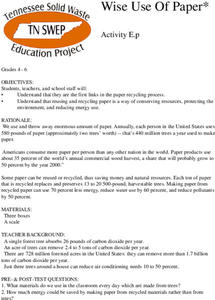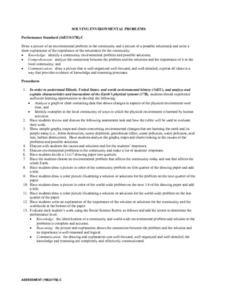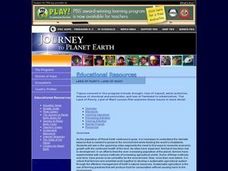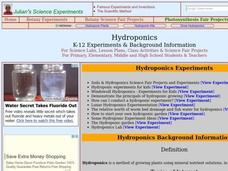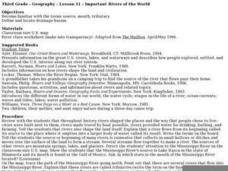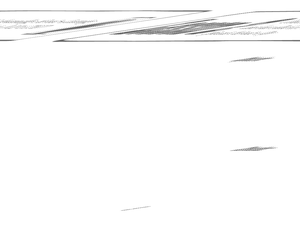Curated OER
Why Should We Clean The Beach?
Students volunteer for the International Coastal Cleanup. They describe the purpose of the Lake Michigan Foundation and a history of the dunes. They reflect on their experiences with writing.
Curated OER
Wise Use of Paper
Students explore the paper recycling process. They experiment with ways to conserve and recycle paper products.
Curated OER
Solving Environmental Problems
Young scholars identify a community environmental problem and possible solutions. They analyze the connection between the problem and the solutions and the importance of it to the local community. Students then draw a picture of an...
Curated OER
Land of Plenty, Land of Want
Students view a video about the state of the environment. They discover the topic of sustainable agriculture. They identify problems and how to solve them.
Curated OER
Construction of a Microscale Fuel Cell
Fuel cells are being called the "energy source" of the future. Allow your high school chemistry class to construct a miscroscale fuel cell, complete with all components to generate energy. This engaging activity will allow them to apply...
Curated OER
Science-Observation Skill Builders
Pupils explore observation while making connections between observation skills and careers (like how farmers observe the weather). They view a variety of nature photographs on the computer and practice their observation skills by...
Curated OER
The Chesapeake Bay in Captain John Smith's Time
When Captain John Smith visited the Chesapeake Bay in the summer of 1608, what types of animals and habitats did he encounter? Your young historians will analyze primary source documents to answer this question, as well as compare the...
University of Wisconsin
Designing a Rain Garden
Now it's time for all of the data collected in previous lessons to be applied to the design of a rain garden. This resource can only be used as part of the greater whole, since learners will need to rely on gathered knowledge in order to...
Curated OER
Adventures in Earth Day: Why Do We Care About Our Environment? - Biology Teaching Thesis
Students are introduced to Earth Day and the importance of this day. They make a collage, students can use articles, pictures, words, etc., in magazines or newspapers or online, that relate to Earth Day, the environment and environmental...
Curated OER
Household Conservation/Efficiency
Hook your class up to an online home energy usage calculator so that they can estimate the amount used per month by their families. Then give them Watt meters with which they will measure the power consumption of several small...
Curated OER
Oil Spill
Fourth graders watch a video about the types of products made from oil or oil used as energy to produce the product. In groups, they identify the positive and negative aspects of oil and participate in various activities. They use the...
Curated OER
Women in Science
Students study the roles that women have played in science throughout history. They work in small groups while visiting the Smithsonian National Museum of American History.
Curated OER
The Rotten Truth
Fourth graders watch a video about how much solid waste is produced by each person and how it is disposed of. Using the internet, they identify and interpret data on the type of trash thrown out the most. They offer possible solutions...
Curated OER
The Last Great Canal
Students read about a cholera outbreak in the 1840's. They read maps, predict how cholera moved throughout the country and participate in a lab activity that demonstrates how disease is spread. They compare cholera through time.
Curated OER
Soil Runoff Challenge
Learners find ways to decrease soil runoff for an African Village as a part of a Peace Corps project. In this soil runoff lesson, students play a soil runoff challenge online. Learners complete online activities and view a slide show to...
University of Wisconsin
A Rain Garden Year
Pupils become plants in an interpretive play that depicts what happens throughout the seasons in a rain garden. As you narrate, students bloom, flower, and go to seed accordingly. The lesson is first in a series of lessons written for...
Curated OER
Hydroponics
Students examine how to grow plants using a hydroponic system. In this hydroponics lesson students identify the advantages and disadvantages of growing plants hydrologically.
NOAA
What's New?
Biodiversity in some areas is more diverse than one might think. Using a two-day lesson plan, pupils consider the biodiversity of the Hudson Canyon and the characteristics of one organism. They begin with an analysis of the common...
Curated OER
Visit to Nature
Students complete a science journal which contains pages in which they can predict what they think they will see before the field trip, and also pages to write down what they actually do see during the field trip.
Curated OER
Important Rivers of the World
Third graders become familiar with names of the different parts of a river, define and locate drainage basins, locate six of the continents and explore the major rivers on each one, conduct research on a river of their choice.
Curated OER
Suspended Particulates lab
Students observe differences between suspended particulates and a solution, and classify common atmospheric gases and particulates. They explain what they think the word suspended means. Students observe the differences between what...
Curated OER
Understanding Service Learning
Young scholars define service learning and reflect on the purpose of the Global Youth Service Day. In this service learning lesson, students discuss and define service learning projects and the role youth has in their community. Young...
Curated OER
Scales, Scutes, and Skins
Students identify the various adaptations of reptiles and amphibians. After distinguishing between reptiles and amphibians, students discuss the ways in which their adaptations aid in their survival. They participate in a hands on...



